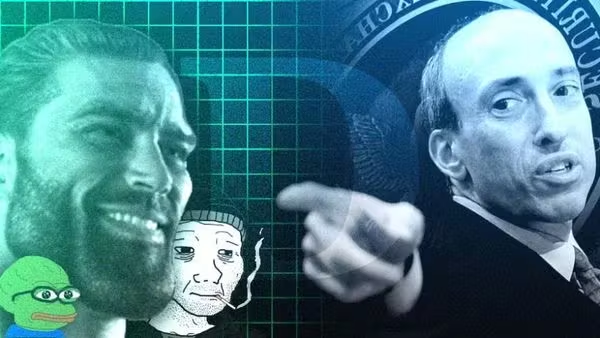By Owen Fernau
The SEC reopened the comment period for a second time on a rulemarking for DeFi
“Everybody,” from decentralized exchanges to open source developers should be worried about a proposed rule change from the SEC, said Miller Whitehouse-Levine, CEO of the DeFi Education Fund.
The SEC reopened the comment period for a second time on a rulemaking which may categorize many DeFi protocols as an “exchange” under the law.
“Everybody and their mother,” should be concerned, Whitehouse-Levine said in an interview. Validators of blockchain transactions, members of DAOs, and open source developers, are potentially liable, he said. The DeFi Education Fund is a research firm which advocates for DeFi with policy-makers.
The proposed change would subject these systems to the regulatory frameworks, which include the know-your-customer (KYC) and anti-money laundering rules. These processes would increase the cost and time required to set up a crypto platform. In the case DeFi protocols, which don’t have control over user assets or information, it’s unclear how they’d even be able to comply.
Addresses Comments
“The big difference between the reopening of the rulemaking a year ago and the reopening of the rulemaking now is that they respond to everyone’s comments from crypto.” said Whitehouse-Levine.
The government agency issued a 166-page document specifically addressing the comments submitted during previous periods on April 14. This comes after an initial proposed 634-page rulemaking released in January 2022, which more generally sought to define which types of entities the SEC will regulate as exchanges.
The SEC has been turning up the heat on crypto projects throughout 2023. Just today, the agency issued a lawsuit against the Bttrex exchange, alleging it traded unregistered securities. Coinbase received a Wells Notice last month, which suggests the company is violating securities laws.
Hester Pierce Response
Hester Pierce, one of five commissioners of the SEC and a supporter of the crypto industry, issued a response to moves by the agency to amend the definition of an exchange. “Rather than embracing the promise of new technology as we have done in the past, here we propose to embrace stagnation, force centralization, urge expatriation and welcome extinction of new technology,” she said in her dissent.
“Communication Protocol System”
The proposed rulemaking rests on the concept of a “communication protocol system,” which Whitehouse-Levin says has a purposely hazy definition. “The intent is to make it as ambiguous as possible as to what a communication protocol system is, which is why they don’t define it,” he said.
Regardless, the rulemaking proposes that if a person makes one of these systems available, they are launching an exchange under the law.
Three Next Steps
Looking forward, Whitehouse-Levine sees three potential next steps for the SEC’s rulemaking — One option, the least desirable for the crypto faithful, is that the SEC could move to finalize the rulemaking subject to a vote.
The second, is yet another comment period is initiated. And third, likely the best for the crypto ecosystem’s future in the United States, is that the rulemaking effort never surfaces again.
Were the SEC to move to finalize the rulemaking, Whitehouse-Levine anticipates a high degree of resistance from both within the crypto community and outside of it. The DeFi Education Fund’s CEO gave the example of a Bloomberg Terminal as being considered an exchange under the SEC’s proposed interpretation of the law. The implication of course is that Bloomberg would take issue with the SEC’s new rule.
Orlando Cosme, a former lawyer in the startup and venture capital space, thinks the resistance to the SEC’s proposed rulemaking would be unequivocal. “If the rule is enacted, I would expect immediate challenges on First Amendment grounds, as well on some other grounds as the rule may actually go beyond the SEC’s statutory authority given how broad it is,” he told The Defiant.



